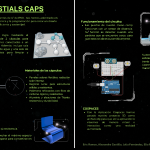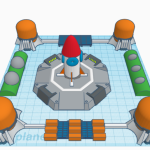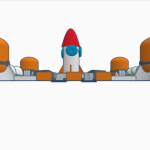Project Mars for Life and Interplanetary Exploration by rblxDFA1
Vânători de foc Ciudad de México-México Mexic 11 ani 1 / Engleză Marte
Descrierea proiectului
Exploring Mars is not just about satisfying our curiosity; it’s about securing humanity’s future beyond Earth. Initiating space exploration missions to Mars holds immense importance, especially concerning the sustainability of life for a small population and the establishment of a rocket launch and landing pad to supply essentials like water and food. Such infrastructure is crucial for sustaining human life on the Red Planet, providing vital resources for survival and facilitating future missions.
To delve deeper into the significance of initiating Mars exploration, we must consider the challenges of sustaining life in an inhospitable environment. Unlike Earth, Mars lacks a breathable atmosphere and is subjected to harsh radiation from the sun. Therefore, developing self-sustaining habitats and resource extraction technologies is paramount for the long-term survival of Martian colonists. Investing in research and development for these technologies is essential for overcoming the logistical hurdles of living on Mars.
Furthermore, having a communication antenna on Mars is essential for monitoring weather patterns and ensuring the safety of inhabitants. Real-time data on atmospheric conditions can help mitigate risks associated with extreme weather events and other environmental hazards, enhancing the resilience of the Martian colony. Additionally, a robust communication network enables efficient coordination of activities and facilitates scientific research, contributing to the overall success of the mission.
Looking ahead, the integration of small bipedal robots could revolutionize the way humans interact with the Martian environment. These robots could assist in construction tasks, reducing the reliance on human labor and minimizing the consumption of resources like food. Their bipedal design allows them to navigate terrain more efficiently and adapt to the unique challenges posed by Mars’ low-gravity environment, ultimately lowering costs and increasing productivity.
In addition to construction and maintenance, bipedal robots could also serve as transportation and exploration aides, further expanding the capabilities of human settlers on Mars. By leveraging robotic assistance, humans can explore more of the Martian surface, conduct in-depth scientific research, and establish a more sustainable presence on the planet. Ultimately, the integration of advanced robotics with human endeavors on Mars represents a significant step towards unlocking the full potential of interplanetary exploration and colonization.
Legătura proiectului
https://mooncampitza.my.canva.site/diego-rblxdfa1-moon-camp
#Design 3D #Experimente științifice
Alte proiecte
CUPE CELESTE TABĂRA LUNII
Sant Boi de Llobregat - Spania







